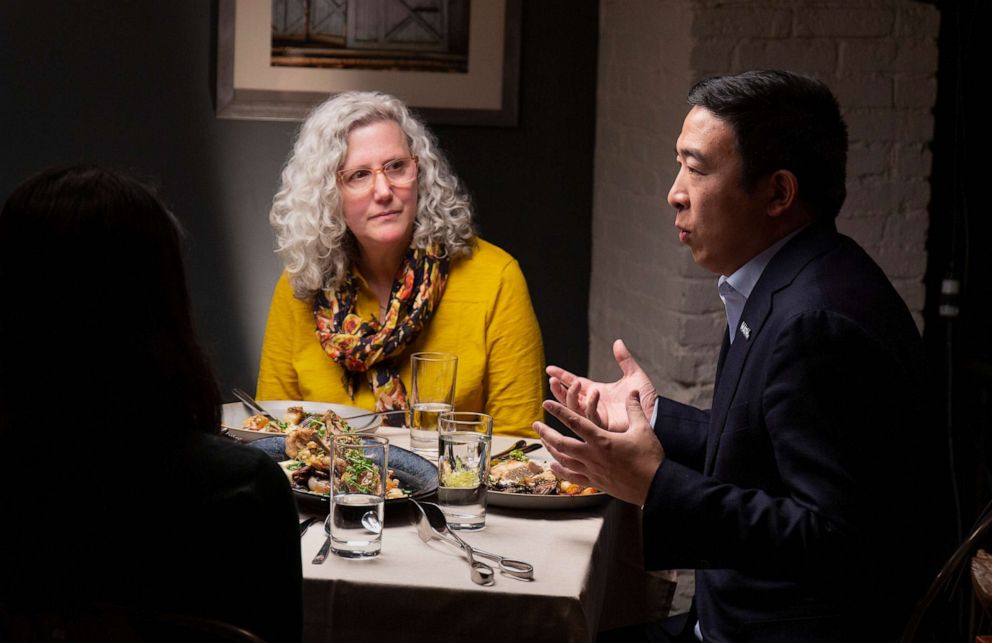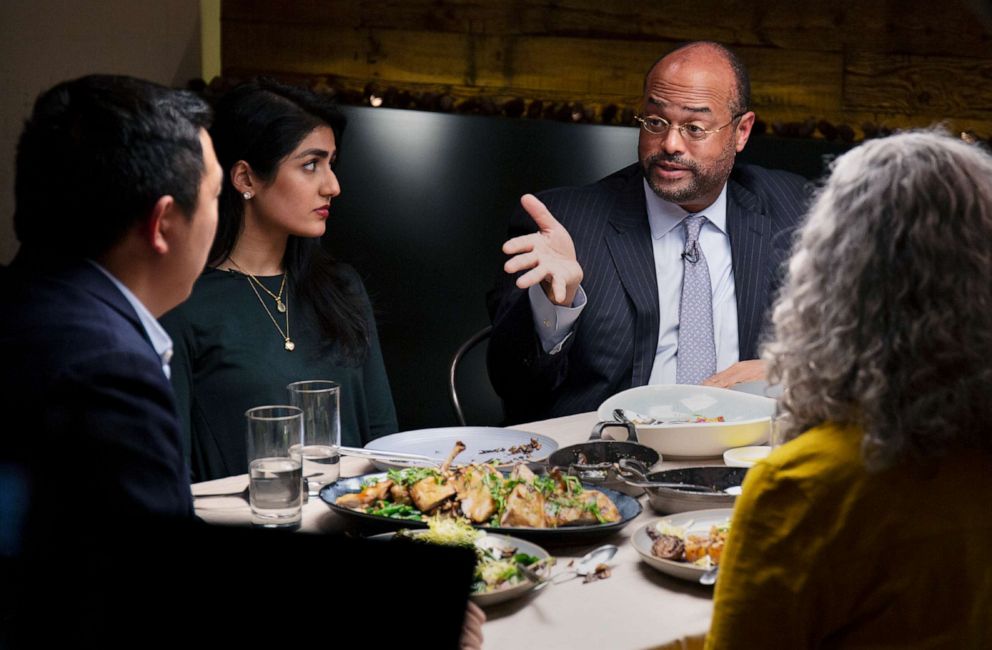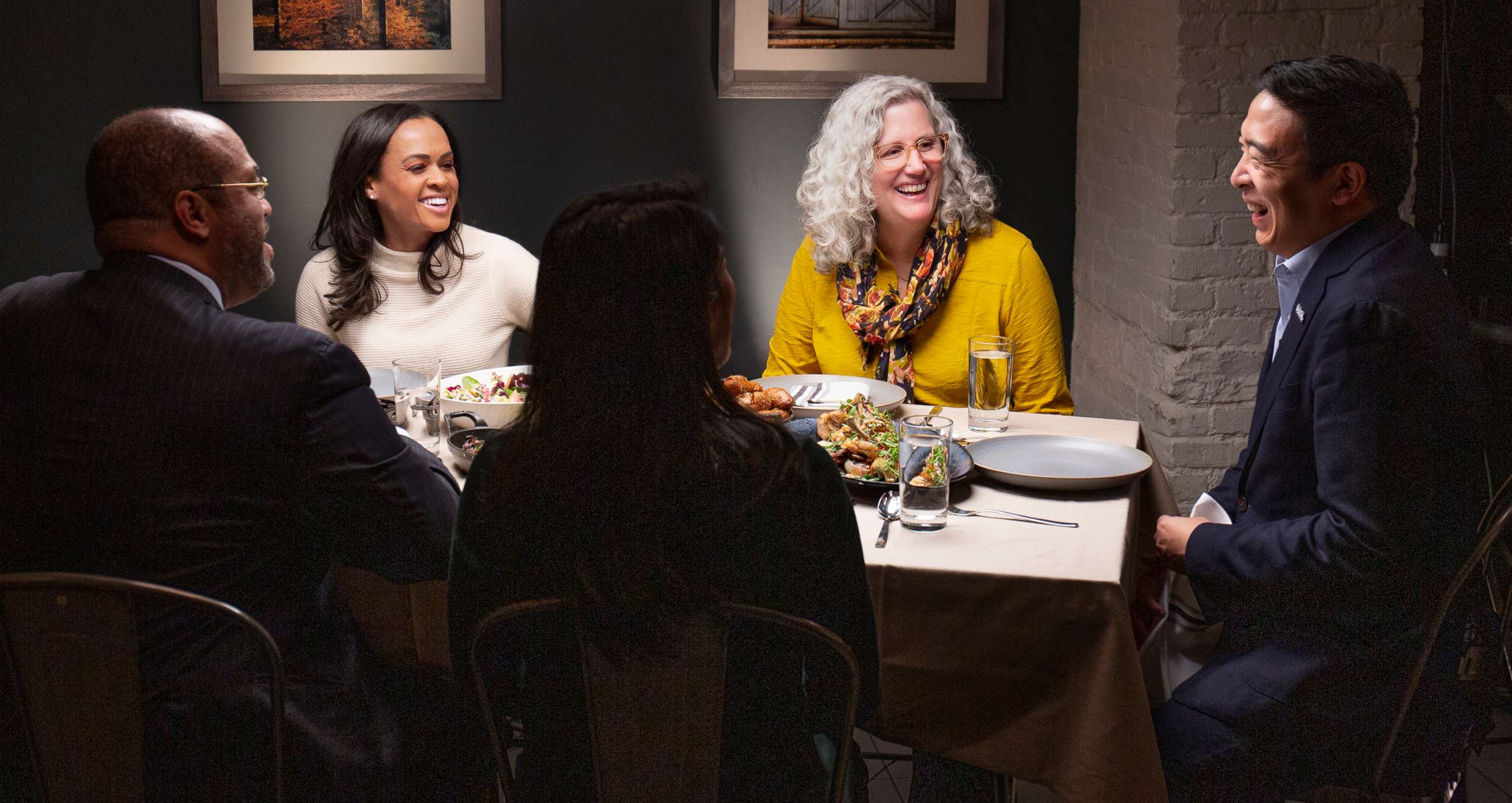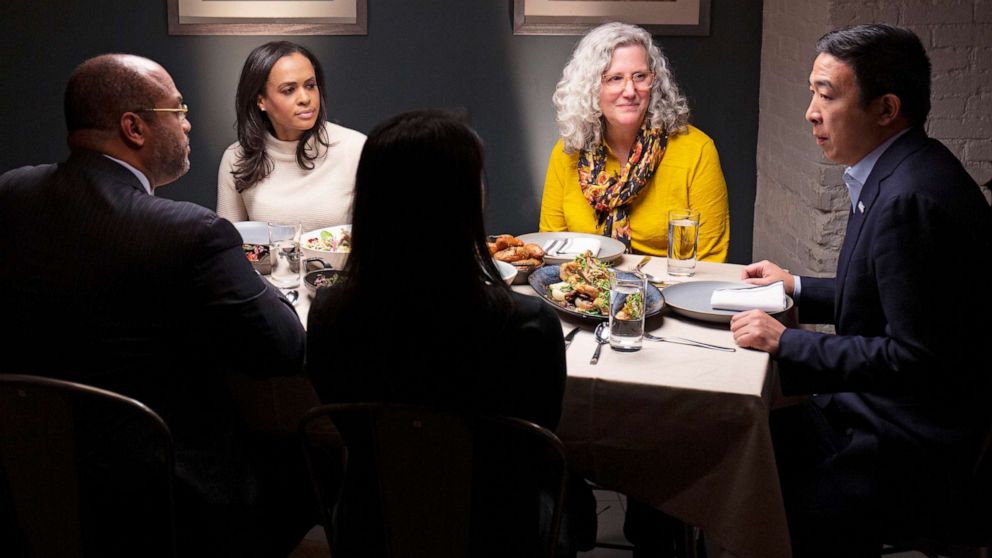Andrew Yang defends 'joke' of Asian stereotypes, talks economic policies at dinner with voters
The 2020 candidate sat down with three voters for an issues-based conversation.
Entrepreneur and presidential candidate Andrew Yang sat with three undecided voters for ABC News' “Around the Table” series, which gives voters the chance to speak with presidential candidates and talk about the dinner-table issues that affect their every day lives.
Sitting with Yang was ABC News correspondent Linsey Davis and Jaslin Kaur, Mara Novak, and Ramsey Smith.
Smith, 52, is an entrepreneur who spent 21 years at Goldman Sachs as an investment banker.
Kaur, 23, is a recent graduate from Hunter College who is an organizer with Know Your IX, an initiative that aims to protect the rights of survivors of sexual assault on school campuses. She also consults for nonprofits on immigration and reproductive health.
Novak, 64, is a teacher and political director of a local group in her hometown in New Jersey.

Yang, a self-proclaimed non-politician, has surpassed the expectations of voters, outlasting sitting senators, former governors, and lifelong politicians.
“The candidate that no one saw coming just beat out a dozen or more senators, governors, Congress people to make that debate stage,” he told a crowd of supporters in Des Moines, Iowa late last year ahead of the December debate. “I will say I am proud to be the only person of color who’s going to be on that stage next week. That is the will of the people.”
Yang failed to meet the Democratic National Committee's criteria of netting at least 5% support in four polls to qualify to appear on the debate stage in Des Moines on Tuesday.
Though he has proudly touted diversity, Yang, the first Asian-American to run for president, has also been criticized for using racial stereotypes during his speeches.
When making his case for his candidacy, Yang often says that, “the opposite of Donald Trump is an Asian man who like Math.” Yang also wears a pin on his lapel that says “MATH”, an acronym for one of his campaign’s slogans, “make America think harder.” In the September Democratic debate, Yang told the audience, “I’m Asian so I know a lot of doctors.”
Kaur, who noted she had been on the receiving end of Asian stereotypes, asked Yang how the conversation about the Asian American community can be more productive in 2020 and beyond without having to rely on “tired stereotypes.”
Yang said he was proud to be the first Asian-American to run for president and said he recognized how “incredibly diverse our community is.”
In December, Yang became the only candidate of color on the debate stage after California Sen. Kamala Harris, who had also qualified, dropped out of the race.
“Certainly my experience is not the norm nor is anyone’s experience the norm, given how broad and diverse our community is. To the extent that I make light of certain stereotypes, I believe that it’s helping expose how ridiculous some of them are,” he told Kaur. “ If I felt like I was actively. Harming our community in some way, then I would feel differently. But right now, and even when I interact with most Asian Americans, most of them are excited about my candidacy.”

To Yang, automation is the greatest threat to American jobs and he often paints a grim prediction of a future in which workers have been replaced by machines and artificial intelligence. His campaign rose to prominence largely due to his signature policy, the “Freedom Dividend.” His plan would give $1000 each month to every American citizen over the age of 18 who opts in.
Smith acknowledged the effect that emerging technology has had on unemployment rates, but questioned if Yang’s universal basic income plan was the right solution.
“The key reason to be excited about a universal basic income is that it one, recognizes the kind of work that we’re already doing that the market does not recognize. So that’s stay-at-home moms, caregivers, nurtures, but also volunteers, artists where thew market is not what it once was,” Yang responded. “And then if you put this money into people’s hands, and you have a foundation, then you create many other jobs in the economy that actually reflect the community’s needs and values.
Yang illustrated his point by posing a hypothetical scenario: if a town of 10,000 adults in Missouri had $1000 a month, it would generate $10 million a month in buying power, he argued.
“Where does that buying power go? It goes to car repairs they’ve been putting off, and daycare expenses, and Little League signups,” Yang said. “And a lot of it circulates over and over again in their town many times over.”

While most candidates in the Democratic field can agree that corporations haven’t paid their fair share in taxes, the way they go about dispersing that wealth differs.
While some, like Massachusetts Sen. Elizabeth Warren have proposed to impose a wealth tax on individuals who earn a certain amount of income, Yang proposes taxing big tech companies and other corporations. This Value Added Tax, he says, would help generate $800 bullion in new revenue and would help to pay for the Freedom Dividend.
Novak, 64, an early childhood teacher and political director for a group called NJ 11th For Change, asked Yang why it doesn’t make more sense to take Sen. Warren’s approach and tax wealthy people’s income instead.
“Wouldn’t it be more suitable to hold that power to account, right? To hold them accountable for what wealth that they’re really hoarding at the one percent,” she asked.
But Yang repeated some of the criticism he has launched at the idea of a wealth tax on the trail, using Amazon CEO Jeff Bezos’s wealth as an example as to how someone as wealthy as him could skirt the rules and avoid paying a wealth tax.
“If you were to increase the income tax rate to seventy, seventy five percent, how much of his $100 billion do we get?” He asked. “Almost none of it, because he’s not dumb enough to pay himself a paycheck of like $5 billion.
Yang has argued that a wealth tax doesn’t work because people would find ways to hide their income in foreign bank accounts or other investments to avoid paying their fair share.
“But a value added tax, what I’m suggesting, we get a toll on his business which is where the money’ is really flowing into,” he told Mara. “And then when he sells some of his stock and buys rocket ships to Mars, then we take a toll on that too.”

Yang concluded the dinner by sharing why he thinks he’s best poised to be president in 2021, telling those around the table that there era the world is in right now is one that pits “numbers versus humanity.”
“The questions is are we willing to accept that the economic value assigned to us by the market is our value as a people?” He asked. “We have to break out of this market mentality and say that we value ourselves intrinsically as human beings.”
The “Humanity First” candidate also took a jab at our current president who he said is a symptom of the economic era the country is in.
“He is a symptom of the fact that we’re in the third inning of the greatest economic transformation in our country’s history,” he said. “We need to catch up and rewrite the rules of this economy to work for us, the people, the human beings of this country as quickly as possible.”
ABC News' Kendall Heath, Jessica Hopper, David Miller, Victoria Moll Ramirez, Shannon Sanders and Candace Smith contributed to this story.